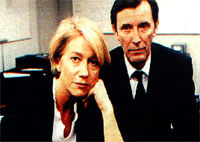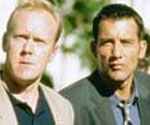February 13, 2006
In the world of television, the people are represented by two separate yet equally important groups: the writers and producers of hour-long crime dramas, and the viewers, who watch said dramas. These are their stories.
Be Careful Out ThereCrime Across the Pond
Let me start with a caveat: I am not by any stretch of the imagination an expert on British crime drama. I am, for one, not British and for two, not in possession of BBC America. Hell, we have enough trouble maintaining our basic cable. Adelphia would NEVER trust us with an upgrade. That being said, I have watched a hell of a lot of MYSTERY, so weÕll let that stand in for my expertise.
 |
Prime Suspect continued through six different series, each one showing Tennison negotiating relationships (mostly unsuccessfully), her career (mostly successfully), and the brutality of the crimes facing modern day Brits. She wasn't a stereotype — the loner with toned arms and a fabulous ass facing off against the police, female only by virtue of her breasts and the fact that she wanted to sleep with men. Her relationships didn't fail because she was a bitter alcoholic, her relationships failed because she was an ambitious woman doing a job that most people (male or female) would have trouble accepting. And Tennison was very, very good at her job — policing and politicking both.
They're pretty enough that I'd even let them play with the remote — and no that's not a euphemism. The remote is a highly valued commodity in this house!! I wouldn't make that offer to just anyone. |
Now, here's where the comparison comes in. I don't think that the mysteries are better per se. CSI is still a choose your own adventure of newspaper headlines and fucked up psychology (hey if Rolling Stone can use that word, so can I. Liz, I'll totally pay the FCC fine, you so know I'm good for it! [We're not supposed to curse on the internet now? Shit. -Liz]). Law and Order's got itss turn the news on its head thing going on, and I distinctly remember mentioning the snakes in people's bodies from Criminal Minds, much as I've sought to erase that from my non-criminal mind. The British Cop Show crimes are equally grisly, equally exploitive of the audience's desire to be scared, to be disturbed — but when you're starting off as a culture with Jack the Ripper, there's really nowhere to go but bloody. But in the execution lies the difference.
Touching Evil a relatively standard genre thriller about a loner detective with a mind for crime, rises above its genre's stereotypes by the quietly nuanced performances of Nicola Walker and Robson Green. More to the point, there's an emphasis on character that allows the audience to care about the detectives as individuals, no matter how much of a stereotype they may have started out as. The show also gives an explanation for Creegan's quiet brooding — getting shot in the head and dying just to be brought back and become suicidal tends to make even the happiest guy anti-social.
Second Sight (Clive Owen and Claire Skinner) also showcases a talented loner, with the added benefit of having him slowly lose his vision and be forced to learn how to function as a detective while keeping his infirmity from his superiors with the help of a fellow detective. The set ups allow the two main detectives to brood, to long, to solve crime, to enact every genre convention developed over last 20 years on both side of the pond and yet we still believe in their abilities. We buy them because... well, in part, we buy it because theyÕre British. Because the entire production process sells us on the plausibility of their actions in a way that American shows no longer try to enact. And well, everything just sounds less ridiculous in British, doesn't it? Quiet expressions of concern? Talking down the killer? Don't you just buy it more when it's got a rise and a lilt? When there's no R in existence? Or is it that everyone just looks more real?
|
| That's not how the American television business works, but I wonder how much more effective the stories we tell might be if we were willing to at least explore this format. It allows the characters to develop, but it also allows the story to spin out in fuller fashion. |
Touching Evil offers an interesting case study in the American vs. British crime drama by virtue of having been made into an unsuccessful America version that aired on USA. I watched a few of the episodes and I have to say I was more intrigued by the American Creegan than I expected to be. Jeffery Donovan had lovely chemistry with co-star Vera Farmiga, and I happened to see the final episode which was a direct remake of one of the sections of the British version's first series. The American version did a very respectable job with the mystery, with Creegan's doubts and abilities and angst, but the British version still has the advantage of a layer of subtlety that we as American viewers rarely appreciate. Donovan's Creegan would be required to display his neurosis hour after hour in a series of self-contained mysteries. Creegan's quirks had to be the star of the show. Green is able to let a few sly glances, a flash back or two, stand in for his madness. ItÕs a difference in approach, it's also a difference in expectation. I will say that I wish that the American version had caught on because I'd have traded it for Monk anyday. Someone please get Tony Shaloub a movie role!! (And don't tell my mother I said this!! She loves Monk!)
Regardless, I think the main difference between British and American crime drama has more to do with format than content. Despite the "gritty realism" of British crime drama, it's just as titillating, just as interested in pushing psychological buttons as American shows. However, the storytelling form changes and shapes the presentation in an interesting way, boxing up the drama so that the viewers get a complete story stretched out over several episodes, enough time to appreciate the features of the stars, but not so much time that they're ready to switch the channel out of disgust at the formula.
Email the author.
Return to Season 2, Episode 10.
All written content © 2005-2006 by the authors. For more information, contact homer@smrt-tv.com

